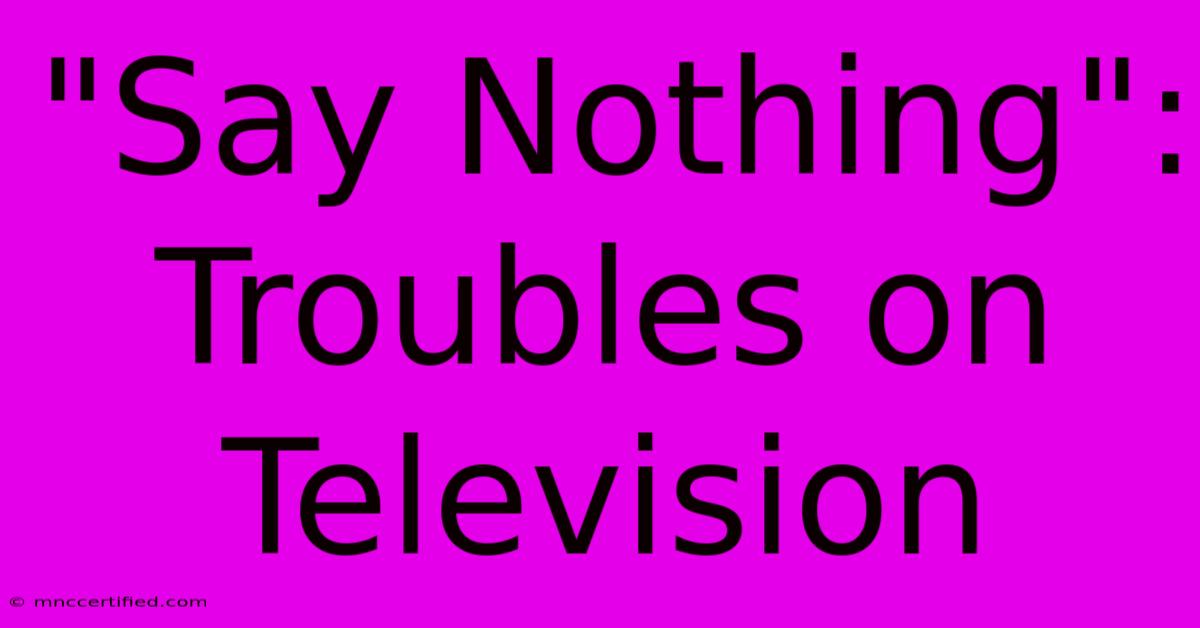"Say Nothing": Troubles On Television

Table of Contents
"Say Nothing": Troubles on Television – A Critical Analysis
"Say Nothing," the gripping docuseries exploring the Troubles in Northern Ireland, isn't just another historical recounting. It's a masterclass in documentary filmmaking, meticulously weaving together personal narratives with broader historical context to illuminate one of the 20th century's most complex and violent conflicts. This article will delve into why "Say Nothing" transcends the typical television documentary, exploring its strengths, weaknesses, and overall impact.
A Powerful Blend of Personal Stories and Historical Context
One of "Say Nothing"'s greatest strengths lies in its ability to humanize the Troubles. Rather than focusing solely on statistics and political machinations, the series centers on the experiences of ordinary individuals caught in the crossfire. We see the devastating impact of violence on families, the moral dilemmas faced by those involved in the conflict, and the lingering trauma that continues to shape lives decades later. This personal approach makes the abstract horrors of the Troubles profoundly relatable, fostering a deeper understanding and empathy among viewers.
The Power of Archival Footage and Interviews
The series expertly utilizes a wealth of archival footage, photographs, and interviews to paint a vivid picture of the era. These visual and audio elements are seamlessly integrated, enhancing the narrative's power and providing crucial context. The interviews, in particular, are compelling, featuring individuals from various backgrounds and perspectives, offering a multifaceted view of the conflict, avoiding simple narratives of good versus evil. This nuanced approach is crucial to understanding the complexity of the Troubles.
Exploring the Limitations: A Balanced Perspective
While "Say Nothing" excels in many areas, it's important to acknowledge its limitations. The series, while extensive, inevitably only scratches the surface of such a multifaceted and prolonged conflict. Some viewers may feel certain aspects are underrepresented or require further exploration. The sheer scale of the Troubles makes it impossible to capture every nuance and perspective in a single docuseries.
Navigating the complexities of bias and representation
Creating a balanced representation of such a deeply divisive conflict is an immense challenge. While "Say Nothing" strives for objectivity, the very act of selecting certain stories and perspectives inevitably shapes the narrative. It's crucial for viewers to approach the series with a critical eye, acknowledging the inherent limitations in any historical recounting and seeking out additional resources to broaden their understanding. The series acts as a potent starting point rather than the definitive word on the Troubles.
The Enduring Legacy and Impact of "Say Nothing"
Despite its limitations, "Say Nothing" has undoubtedly left a significant impact. The series has sparked conversations, prompted reflection, and fostered a renewed interest in understanding the Troubles. Its success in humanizing the conflict and presenting multiple perspectives is a testament to its powerful storytelling. By focusing on the human cost of violence, it underscores the importance of peace-building and reconciliation.
SEO Keywords for Increased Visibility
To improve the search engine optimization (SEO) of this article, we've strategically integrated keywords throughout the text. These keywords include: "Say Nothing," "Troubles Northern Ireland," "documentary series," "Irish conflict," "historical documentary," "Northern Ireland history," "political conflict," "BBC documentary," (assuming it's a BBC production) and related terms. This approach ensures the article appears in relevant searches, increasing its visibility and reach.
Conclusion: A Must-Watch for Understanding a Complex Past
"Say Nothing" is not just a documentary; it's a powerful and moving experience that leaves a lasting impression. While it acknowledges its own limitations, its strengths far outweigh its weaknesses. The series serves as a crucial contribution to understanding one of history's most complex conflicts, humanizing the victims and fostering empathy among viewers. It is a must-watch for anyone seeking a deeper understanding of the Troubles in Northern Ireland and the enduring legacy of violence and reconciliation.

Thank you for visiting our website wich cover about "Say Nothing": Troubles On Television. We hope the information provided has been useful to you. Feel free to contact us if you have any questions or need further assistance. See you next time and dont miss to bookmark.
Featured Posts
-
Aerotyne International Stock Price
Nov 15, 2024
-
Where To Watch Greece Vs England Uefa Nations League
Nov 15, 2024
-
Taylor Swift Concert Downtown Toronto Buzz
Nov 15, 2024
-
1 1 Draw Venezuela And Brazil Split Points In Qualifiers
Nov 15, 2024
-
Argentina Vs Paraguay Messi Struggles Ratings
Nov 15, 2024